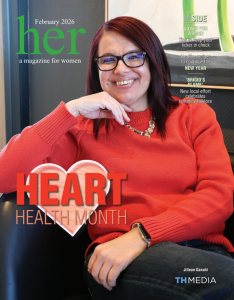By 2025, there will be more than 1 billion women experiencing menopause in the world, which will be 12% of the entire world population. Most women hit menopause by their 50s; however, changes in the body start to appear earlier than you might think, often many years before a woman officially hits menopause. This time in a woman’s life can bring bothersome and debilitating symptoms which can significantly affect a woman’s health and daily routines.
Women might notice physical changes in their skin as one of the first symptoms as they age.
“When you’re young, your body produces an abundance of collagen, the main skin-supporting protein that keeps your face supple and hydrated, ” said nationally renowned natural health physician and author Fred Pescatore. “Studies show that women lose about 30% of their skin’s collagen during the first five years of menopause due to hormonal shifts.”
With collagen loss, skin becomes thinner and prone to wrinkles. It also loses the ability to protect itself, maintain hydration, and produce strong collagen the way it once could. Many women see these changes reflected in increased bags under the eyes, sagging neck skin, and increased hyperpigmentation in the face and hands.
There are several ways for women to minimize and manage skin health concerns that appear during this period.
Minimize sun exposure
Try to avoid direct sun exposure. Some women experience increased hyperpigmentation on their face and hands, often referred to as dark spots, leading up to and during menopause. This is caused by a combination of hormonal changes and sun exposure.
“You can help minimize your skin’s exposure to the sun by wearing SPF, hats and gloves when outdoors,” Pescatore said.
Take shorter showers
Keep showers short and not too hot.
“Spending too much time in water, especially hot water, strips natural oils from your skin, leaving it dry,” Pescatore said.
In the time leading up to and during menopause, your skin is at increased risk for dryness, so try to take short, lukewarm showers to keep skin optimally hydrated.
Add a proven supplement
Look for ingredients that can stimulate collagen production and help improve the health of your skin from inside and out. Numerous clinical studies have shown that daily supplementation with the super-antioxidant Pycnogenol (Pic-noj-en-all) French maritime pine bark extract can help minimize various skin concerns middle-aged women experience.
Pycnogenol binds with existing skin proteins, collagen and elastin, stimulates the genesis of new collagen and hyaluronic acid, and protects skin from various harmful enzymes, helping to rebuild elasticity for a smooth, younger look. Additionally, Pycnogenol has been shown to reduce hyperpigmentation for a more even complexion. A recent study, published in 2021, found that those who supplemented with 100mg of Pycnogenol for 12 weeks during dry winter months experienced a 13% improvement in both skin elasticity and skin firmness.
“Pycnogenol is one of the most studied ingredients on the market, with decades of research showing the benefits of this natural extract for a variety of health applications,” Pescatore said. “In fact, the extract has specifically been studied on menopausal women, so the skin benefits complement its additional women’s health benefits nicely.”
Available in more than 1,000 dietary supplements, topical creams, and health products worldwide, more information about Pycnogenol can be found by visiting pycnogenol.com.
As women enter the middle phase of life, a host of new skin concerns can appear. Evolving one’s skin care routine and making natural lifestyle changes can help women meet the challenges of menopause.
Visible light is the light we can see, and excessive amounts of exposure can contribute to the production of free radicals, which could have negative, aging effects on the skin.
VL comes in many forms, from sunlight to the light emitted from digital screens like cellphones and laptops. That’s why experts advise taking steps to protect your skin year round.
“Free radical damage is an invisible stressor that can be produced from sources like pollution, UV rays and even digital devices,” says New York City-based dermatologist Rachel Nazarian. “Over time, free radical damage can degrade your collagen and cause aging of the skin, and in some cases, it can even lead to skin cancer.”
Nazarian recommends taking the following steps to protect your skin:
Wear SPF: Apply a topical SPF sunscreen every day and remember, incidental sun exposure through windows, open and closed, also counts, so think beyond outdoor skin exposure.
Protect your lips and eyes: A lip balm containing SPF will work double duty, protecting your lips from chapping in the face of winds and cooler temperatures, while offering protection from UV rays. Be sure to also protect your eyes with UV-blocking sunglasses.
Limit screen time: There are numerous wellness benefits associated with limiting screen time each day, and now, you can add protecting your skin to the list.
Double down: Collaborative research published by the “Journal of Drugs in Dermatology” in 2019 by doctors at Wayne State University and Beaumont Hospital in Michigan, as well as Srinagarind Hospital in Thailand, suggests that when Polypodium leucotomos extract is used as an antioxidant, it provides a secondary line of defense to protect against the effects of VL. Heliocare Daily Use Antioxidant Formula is a natural dietary supplement that has antioxidant properties due to Fernblock PLE Technology, an antioxidant naturally derived from the extract PLE. Clinically proven and dermatologist recommended, the PLE in Heliocare helps to combat the negative effects of free radicals, including those that arise due to the exposure of VL. For more information, visit heliocare.com.
During cooler months often spent inside, many people let their guard down when it comes to skin protection. Be sure your wellness routine includes steps to keep skin protected and healthy-looking from the inside out.























































